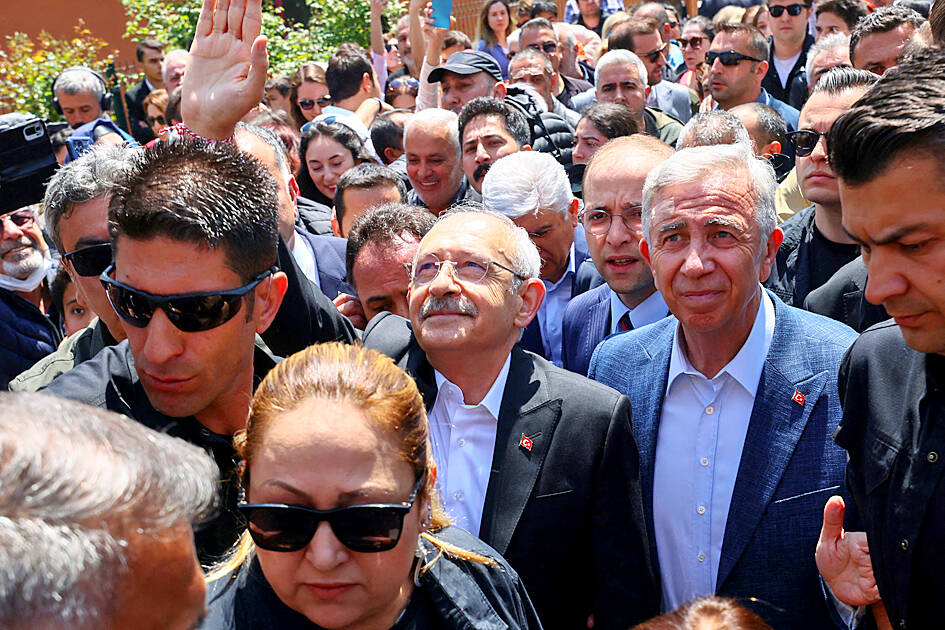Turks yesterday voted in one of the most important elections in modern Turkey’s 100-year history, which could either unseat Turkish President Tayyip Erdogan and halt his government’s increasingly authoritarian path or usher in a third decade of his rule.
The vote would decide not only who leads Turkey, a NATO-member country of 85 million, but also how it is governed, where its economy is headed amid a deep cost of living crisis and the shape of its foreign policy, which has taken unpredictable turns.
Opinion polls give Erdogan’s main challenger, Kemal Kilicdaroglu, who heads an alliance of six opposition parties, a slight lead, but if either of them fail to get more than 50 percent of the vote a runoff election would be held on Sunday next week

Photo: Reuters
Voters were also electing a new parliament, likely a tight race between the People’s Alliance comprising Erdogan’s conservative Justice and Development Party (AKP), the Nationalist Movement Party (MHP) and others, and Kilicdaroglu’s Nation Alliance formed of six opposition parties, including his secularist Republican People’s Party (CHP), established by modern Turkey’s founder, Mustafa Kemal Ataturk.
Polls opened at 8am and were to close at 5pm. Under Turkish law, the reporting of any results is banned until 9pm.
In Diyarbakir, a city in the mainly Kurdish southeast which was hit by a devastating earthquake in February, some said they had voted for the opposition and others for Erdogan.
“A change is needed for the country,” 26-year-old Nuri Can said, citing Turkey’s economic crisis as the reason for voting for Kilicdaroglu. “After the election there will be an economic crisis at the door again, so I wanted change.”
Yet Hayati Arslan said that he had voted for Erdogan and the AKP.
“The country’s economic situation is not good, but I still believe that Erdogan will fix this situation. Turkey’s prestige abroad has reached a very good point with Erdogan and I want this to continue,” teh 51-year-old said.
Queues formed at polling stations in the city, with about 9,000 police officers on duty across the province.
Many in the provinces affected by the earthquake, which killed more than 50,000 people, have expressed anger over the slow initial government response, but there is little evidence that the issue would change how people vote.
Kurdish voters, who account for 15 to 20 percent of the electorate, will play a pivotal role, with the Nation Alliance unlikely to attain a parliamentary majority by itself.
The pro-Kurdish Peoples’ Democratic Party (HDP) is not part of the main opposition alliance, but fiercely opposes Erdogan after a crackdown on its members over the past few years.
The HDP has declared its support for Kilicdaroglu in the presidential race. It is entering the parliamentary elections under the emblem of the small Green Left Party due to a court case filed by a top prosecutor seeking to ban the HDP over links to Kurdish militants, which the party denies.

Kehinde Sanni spends his days smoothing out dents and repainting scratched bumpers in a modest autobody shop in Lagos. He has never left Nigeria, yet he speaks glowingly of Burkina Faso military leader Ibrahim Traore. “Nigeria needs someone like Ibrahim Traore of Burkina Faso. He is doing well for his country,” Sanni said. His admiration is shaped by a steady stream of viral videos, memes and social media posts — many misleading or outright false — portraying Traore as a fearless reformer who defied Western powers and reclaimed his country’s dignity. The Burkinabe strongman swept into power following a coup in September 2022

‘FRAGMENTING’: British politics have for a long time been dominated by the Labor Party and the Tories, but polls suggest that Reform now poses a significant challenge Hard-right upstarts Reform UK snatched a parliamentary seat from British Prime Minister Keir Starmer’s Labor Party yesterday in local elections that dealt a blow to the UK’s two establishment parties. Reform, led by anti-immigrant firebrand Nigel Farage, won the by-election in Runcorn and Helsby in northwest England by just six votes, as it picked up gains in other localities, including one mayoralty. The group’s strong showing continues momentum it built up at last year’s general election and appears to confirm a trend that the UK is entering an era of multi-party politics. “For the movement, for the party it’s a very, very big

ENTERTAINMENT: Rio officials have a history of organizing massive concerts on Copacabana Beach, with Madonna’s show drawing about 1.6 million fans last year Lady Gaga on Saturday night gave a free concert in front of 2 million fans who poured onto Copacabana Beach in Rio de Janeiro for the biggest show of her career. “Tonight, we’re making history... Thank you for making history with me,” Lady Gaga told a screaming crowd. The Mother Monster, as she is known, started the show at about 10:10pm local time with her 2011 song Bloody Mary. Cries of joy rose from the tightly packed fans who sang and danced shoulder-to-shoulder on the vast stretch of sand. Concert organizers said 2.1 million people attended the show. Lady Gaga

SUPPORT: The Australian prime minister promised to back Kyiv against Russia’s invasion, saying: ‘That’s my government’s position. It was yesterday. It still is’ Left-leaning Australian Prime Minister Anthony Albanese yesterday basked in his landslide election win, promising a “disciplined, orderly” government to confront cost-of-living pain and tariff turmoil. People clapped as the 62-year-old and his fiancee, Jodie Haydon, who visited his old inner Sydney haunt, Cafe Italia, surrounded by a crowd of jostling photographers and journalists. Albanese’s Labor Party is on course to win at least 83 seats in the 150-member parliament, partial results showed. Opposition leader Peter Dutton’s conservative Liberal-National coalition had just 38 seats, and other parties 12. Another 17 seats were still in doubt. “We will be a disciplined, orderly